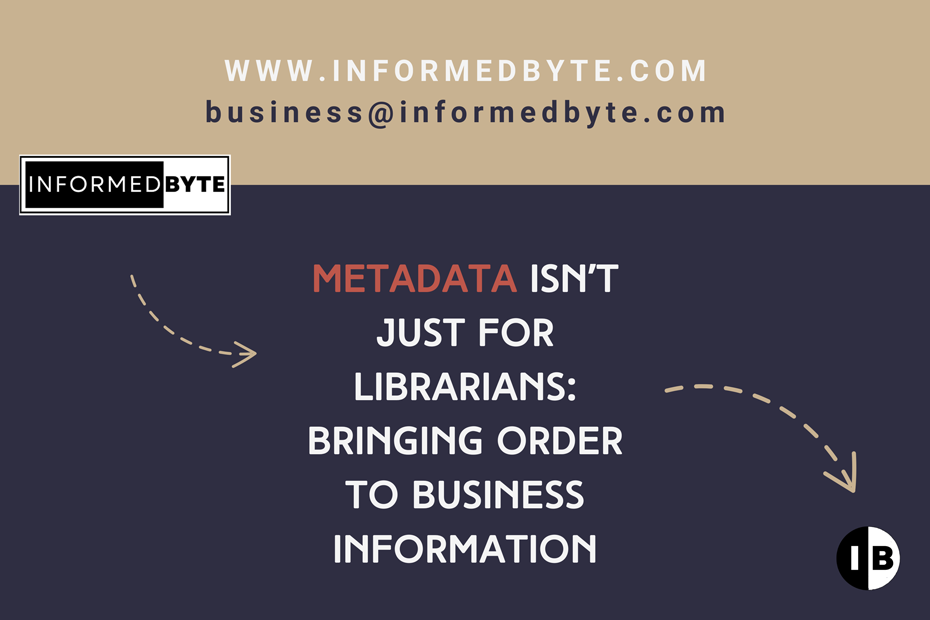Metadata Isn't Just for Librarians: Bringing Order to Business Information
October 14, 2025
The importance of metadata cannot be overstated. But often, when people hear the term “metadata,” they think of libraries, archives, or academic institutions. While it's true that metadata has long played a foundational role in organising information in these spaces, the relevance of metadata has expanded far beyond traditional sectors. In fact, for modern businesses across every industry, metadata is the unsung hero that powers efficiency, supports decision-making, and ultimately fuels growth.

Image credit by mahyar motebassem on Unsplash
At Informed Byte, we do work with libraries sometimes but also understand that metadata isn't just for librarians. It's for every business that deals with information—whether that's product data, customer records, legal files, marketing content, or anything in between. Metadata should be central to your business strategy, it's role is to create order out of chaos, and should provide the clarity you need to thrive in an increasingly complex digital landscape.
What is Metadata, Really?
In its simplest form, metadata is data about data. It's the information that describes, explains, and contextualises the content in your systems. For example, if you have a customer database, metadata could include the name of the database, the fields within it (like “name,” “email address,” “date of purchase”), and how the information in the database is structured.
But metadata goes far beyond just a description. It governs how information is stored, how it's searched, and how it's retrieved. When properly structured, metadata can ensure consistency, improve searchability, and even enhance the accuracy of data analytics. Essentially, metadata is the foundation that allows businesses to manage vast amounts of data efficiently.
Why Metadata Matters for Your Business
You may be wondering: “Why is metadata crucial for my business?” After all, your focus is on growth, innovation, and market strategy—not on organising data. However, the truth is, efficient metadata management can be a game-changer for your organisation's productivity, insights, and overall competitiveness.
1. Unlocks Efficiency
Imagine your business has thousands—or even millions—of documents, records, and assets across various departments. Without a consistent approach to metadata, finding the right information can become a cumbersome process. Employees waste valuable time sifting through files, and you risk making decisions based on incomplete or outdated data.
Good metadata management acts as an organisational tool that streamlines access to information. By tagging assets with relevant metadata (e.g., project names, client details, document types), you create a searchable framework that allows your teams to retrieve what they need in seconds. This leads to faster decision-making and more efficient workflows.
2. Enhances Data Discoverability
In business, data is only valuable when it's accessible and understandable. Without well-structured metadata, your data can become a “black hole” that no one can navigate. Important customer insights, legal documents, or product specs might remain buried in a cluttered database, untouched and underutilised.
Metadata solves this problem by enhancing discoverability. Think of it as the library card catalogue for your digital assets. Properly applied metadata allows you to tag content with relevant keywords, categories, and attributes, making it easier to locate and analyse.
3. Improves Data Consistency and Accuracy
In large organisations, multiple teams and departments may create and store data independently. As a result, you often end up with multiple versions of the same data, stored in different ways. This creates the risk of inconsistent or inaccurate information.
By defining clear metadata standards and applying them consistently, you can enforce uniformity across all your business data. This leads to greater accuracy in reporting, improved customer service, and better-informed strategic decisions.
4. Facilitates Compliance and Security
In today's regulatory environment, data compliance is more important than ever. Businesses must adhere to a growing array of laws and standards regarding privacy, data protection, and record-keeping. Metadata plays a pivotal role in compliance by providing a structured way to track and audit information.
For example, if you need to demonstrate that certain data was created or modified on a specific date, metadata can help you trace the history of that data. It can also help identify sensitive information and ensure that only the right people have access to it. By using metadata to enforce data governance policies, you can mitigate compliance risks and avoid costly penalties.
Bringing Order to Chaos: The Role of Metadata in Business Operations
Without metadata, business information quickly becomes disorganised, siloed, and unusable. Think about it: in your company, data likely lives in multiple platforms—your CRM, document management system, product databases, financial systems, and more. Without a cohesive approach to metadata, it can be nearly impossible to connect the dots between different data sets, let alone gain insights from them.
Informed Byte understands that the chaos of disparate data systems is one of the biggest challenges businesses face today. But with a robust metadata strategy, you can bring order to this chaos. Let's explore how metadata provides clarity in your operations.
1. Connecting the Dots Across Data Systems
Many businesses use a range of software tools that don't always “talk” to each other. For example, customer data may reside in your CRM, while financial data is stored in your ERP system. When you try to pull together insights across these systems, it can feel like piecing together a jigsaw puzzle without the picture.
By applying consistent metadata standards across all systems, you create connections between different data sets. For example, if both your CRM and ERP system tag customer records with the same metadata (such as a “customer ID”), you can more easily link financial transactions with customer profiles. This enables a 360-degree view of your business, allowing you to make data-driven decisions that consider all available information.
2. Automating Workflows and Processes
Metadata not only helps you organise data, but it can also drive automation. For example, by tagging documents with metadata such as “approval status,” “deadline,” or “department,” you can automatically route them to the right team members at the right time. Similarly, in product management, metadata can help trigger processes like inventory updates, pricing adjustments, or order fulfilments based on the data's attributes.
When your workflows are built around well-defined metadata, you reduce manual errors, ensure consistent execution, and ultimately boost productivity.
3. Optimising Search and Retrieval
In the digital age, we are drowning in information. What used to be neatly filed away in cabinets is now stored in servers and cloud storage. But with so much data available, how do you ensure the right people can quickly access the right information?
Good metadata is the answer. It enhances search capabilities by providing descriptive tags and keywords that make it easy to locate specific data. Whether you're looking for a marketing campaign brief, a customer contract, or a product specification sheet, metadata ensures that the right documents come to the forefront during a search.
How Informed Byte Can Help: Implementing a Metadata Strategy
At Informed Byte, we're experts in metadata strategy, implementation, and optimisation. We work closely with businesses across various sectors to help them structure their data in a way that maximises its value.
1. Tailored Metadata Schema Design
One size doesn't fit all when it comes to metadata. Every business has unique needs, and your metadata should reflect that. We'll help you design a metadata schema that aligns with your specific data types, workflows, and business goals. Whether you're managing documents, media files, customer data, or anything else, we'll ensure that your metadata is comprehensive and scalable.
2. Metadata Governance and Standards
A metadata strategy is only effective if it's applied consistently. At Informed Byte, we'll help you develop metadata governance policies that define who is responsible for creating, maintaining, and updating metadata. These standards ensure that your metadata is used consistently across all departments, making your data easy to manage, access, and trust.
3. Metadata Automation and Integration
Managing metadata doesn't have to be a manual process. With the right tools and integrations, we can help automate metadata tagging and ensure that it's applied seamlessly across your business systems. By integrating metadata with your document management systems, CRM platforms, and other tools, we'll create an automated system that works behind the scenes to maintain order and consistency.
Informed Byte and Metadata partnership is Key to Business Success
At Informed Byte, we believe that metadata is more than just a technical necessity—it's a critical component of your business's strategy for growth, efficiency, and success. It's the invisible infrastructure that helps you navigate the complexities of your data, enabling better decision-making, improved operational efficiency, and stronger compliance.
If you're ready to bring order to your business information and unlock the true potential of your data, contact us today. Let's work together to create a metadata strategy that drives your business forward.
Let's chat about your metadata
